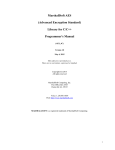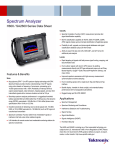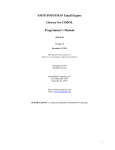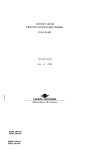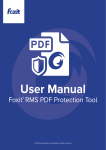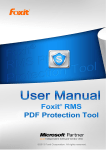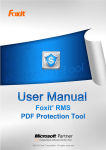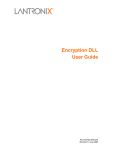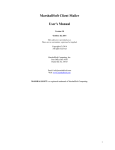Download AES_4D - MarshallSoft Computing
Transcript
MarshallSoft AES (Advanced Encryption Standard) Library for Delphi Programmer's Manual (AES4D) Version 3.0 May 29, 2015 This software is provided as-is. There are no warranties, expressed or implied. Copyright (C) 2015 All rights reserved MarshallSoft Computing, Inc. Post Office Box 4543 Huntsville AL 35815 Email: [email protected] Web: www.marshallsoft.com MARSHALLSOFT is a registered trademark of MarshallSoft Computing. 1 TABLE OF CONTENTS 1 Introduction 1.1 Features 1.2 Documentation Set 1.3 Example Program 1.4 Installation 1.5 Uninstalling 1.6 Pricing 1.7 Updates 2 Library Overview 2.1 Keycode 2.2 Error Display 2.3 Adding AES4D to your Project 2.4 Passing Pointers 3 Compiler Issues 3.1 Delphi Versions 3.2 Delphi Personalities 3.3 Compiling Programs 3.4 Converting Win32 Projects to Win64 4 Example Programs 5 Revision History Page Page Page Page Page Page Page Page Page Page Page Page Page Page Page Page Page Page Page Page 3 4 5 6 7 7 7 7 8 8 8 8 9 10 10 12 12 12 13 14 2 1 Introduction The MarshallSoft Advanced Encryption Standard Library for Delphi (AES4D) is a toolkit that allows software developers to easily implement strong encryption and decryption into a Delphi application. The MarshallSoft Advanced Encryption Standard Library (MarshallSoft AES) is a component (DLL) library of functions used to perform encryption and decryption using the 256-bit "Advanced Encryption Standard" (AES) as specified by the U.S. National Institute of Standards and Technology (NIST). See http://csrc.nist.gov/publications/fips/fips197/fips-197.pdf AES is considered "strong encryption" and replaces the previous U.S. encryption standard "Data Encryption Standard" (DES). AES is commonly used by many financial entities such as banks to protect their customer's sensitive information. Our implementation of the Advanced Encryption Standard (AES) has been verified by running the "Advanced Encryption Standard Algorithm Validation Suite" (AESAVS), which can be found at http://csrc.nist.gov/groups/STM/cavp/documents/aes/AESAVS.pdf. This MarshallSoft Advanced Encryption Standard (AES) Programmers Manual for Delphi provides information need to compile and run programs in a Delphi programming environment. The MarshallSoft Advanced Encryption Standard DLL's will work under all versions of Windows (2003-2012/XP/Vista/NT/Windows7/Windows 8). Both Win32 and Win64 DLL's are included. AES4D includes several Delphi example programs which demonstrate AES encryption and decryption. The MarshallSoft Advanced Encryption Standard Library for Delphi component library supports and has been tested with all 32-bit and 64-bit versions of Delphi including: • Borland Delphi (2.0, 3.0, 4.0, 5.0. 6.0 and 7.0) • Borland Delphi 8 for .NET • Borland Delphi 2005 & 2006 • Borland Turbo Delphi • Codegear Delphi 2007 • Embarcadero Delphi 2009 & 2010 • Embarcadero Delphi XE, XE2, XE3, XE4, XE5, XE6, XE7 and XE8 The MarshallSoft AES DLLs (AES32.DLL and AES64.DLL) can also be used from any language (C/C++, .NET, C#, Visual Basic, Visual FoxPro, COBOL, Xbase++, Visual dBase, Microsoft Office, etc.) capable of calling the Windows API. For the latest version of the MarshallSoft AES software, see www.marshallsoft.com/aes4d.htm. Legalities It is illegal to possess strong encryption software in some countries in the world. Do not download or use this software if it is illegal to do so in your country. In addition, this software cannot be sold to countries on the U.S. Embargo List. See http://www.pmddtc.state.gov/embargoed_countries/index.html 3 1.1 Features Some of the many features of the Advanced Encryption Library (AES) component library are as follows: Supports both 32-bit and 64-bit Windows. Implements the 256-bit "Advanced Encryption Standard" (Rijndael) Supports ECB (Electronic Cookbook) mode. Supports CBC (Cipher Block Chaining) mode. Supports SHA-256 cryptographic hash algorithm. Supports PKCS7 padding. Free technical support and updates for one year. License covers all programming languages. Royalty free distribution with a compiled application. Evaluation versions are fully functional. (30 day trial). No unlock code is required. Can be used from GUI mode or console mode programs. Is fully thread safe. Supports Windows 95/98/Me/NT/2000/2003/2012/XP/Vista/Window 7/Windows 8. Implemented as a standard Windows DLL, which will work with all versions of Windows. Both Win32 and Win64 DLLs are included. Is native Windows code but can also be called from managed code. Will run on machines with or without .NET installed. Works with all 32-bit and 64-bit versions of Delphi. Does not depend on support libraries. Makes calls to core Windows API functions only. Can be used with any program (in any language) capable of calling Windows API functions such as C/C++, C#, Visual FoxPro, Delphi, Xbase++, dBASE or COBOL. Can be purchased with (or without) source code. Updates are free for one year (source code updates are separate). Unlimited one-year email and phone tech support. Documentation online as well as in printable format. A selection of Delphi example programs with full source code is included. Refer to Section 4 for more details on each of the example programs. 1. 2. 3. 4. aesver TestAES Crypto Password Displays AES4D version Performs AES encryption / decryption tests Encrypts and/or decrypts a file Manages passwords kept encrypted on disk. 4 1.2 Documentation Set The complete set of documentation consists of three manuals in Adobe PDF format. This is the first manual (AES_4D) in the set. AES4D Programmer’s Manual (AES_4D.PDF) AES User’s Manual (AES_USR.PDF) AES Reference Manual (AES_REF.PDF) The AES_4D Programmer’s Manual (AES_4D.PDF) is the language specific (Delphi) manual. All language dependent programming issues such as compiling, compilers and example programs are discussed in this manual. Read this manual first. The AES User’s Manual (AES_USR.PDF) discusses email processing as well as language independent programming issues. Purchasing and licensing details are also provided. The AES Reference Manual (AES_REF.PDF) contains details on each individual AES function. A list of error codes is also provided. Online documentation can be accessed on the MarshallSoft AES Library for Delphi product page at: http://www.marshallsoft.com/aes4d.htm 5 1.3 Example Program The following example demonstrates the use of some of the MarshallSoft AES Library for Delphi component library functions. function EncryptFile(Pass:AnsiString; FileName:AnsiString):Integer; var Code : Integer; CB : AnsiString; // control buffer Vector : AnsiString; // initialization vector (not used) KeyBuf : AnsiString; // encryption key Source : AnsiString; // source pathname Target : AnsiString; // target pathname begin {user AES space for control} CB := '*'; {attach AES} Code := aesAttach(AES_KEY_CODE, 0); if Code < 0 then begin EncryptFile := -1; exit; end; {create encryption key buffer & initialization vector} KeyBuf := StringOfChar(Chr(0), AES_KEY_SIZE); Vector := StringOfChar(Chr(0), AES_BLOCK_SIZE); {process password phrase} Code := aesMakeUserKey(@Pass[1], @KeyBuf[1], 0); if Code < 0 then begin EncryptFile := Code; exit end; {initialize AES for encrypting (ECB mode)} Code := aesInitAES(@KeyBuf[1],@Vector[1],AES_ECB_MODE,AES_ENCRYPT,@CB[1]); if Code < 0 then begin {aesInitAES fails} EncryptFile := Code; exit end; {construct file names for encryption} Source := FileName + Chr(0); Target := FileName + '.aes' + Chr(0); {encrypt source file to target file} Code := aesEncryptFile(@CB[1], @Source[1], @Target[1]); if Code < 0 then begin {aesEncryptFile fails} EncryptFile := Code; exit end; end; 6 1.4 Installation (1) Before installation of AES4D, a Delphi compiler (any version) should already be installed. (2) Unzip AES4D30.ZIP (evaluation version) or AESxxxxx.ZIP (purchased version where xxxxx is your Customer ID) using any Windows unzip program. (3) Run the installation program, SETUP.EXE, which will install all AES4D files including copying AES32.DLL and AES64.DLL to the Windows directory. (4) For a quick start, load project file AESVER.DPR 1.5 Uninstalling Uninstalling AES4D is very easy. First, run UINSTALL.BAT, which will delete AES32.DLL from your Windows directory, typically C:\WINDOWS for Windows 2003-2012/Vista/Windows 7/Windows 8. Second, delete the AES project directory created when installing AES4D. 1.6 Pricing A developer license for the MarshallSoft AES Library for Delphi can be purchased for $115 USD. Purchasing details can be found in Section 1.4, "How to Purchase", of the AES User’s Manual (AES_USR.PDF). Also see INVOICE.TXT provided with the evaluation version or order directly on our web site at http://www.marshallsoft.com/order.htm Registration includes one year of technical support and free updates. Purchased AES DLLs never expire. 1.7 Updates When a developer license is purchased, the developer will be sent a registered DLL plus a license file (AESxxxx.LIC, where xxxx is your Customer ID). The license file can be used to update the registered DLL’s for a period of one year from purchase. Updates can be downloaded from http://www.marshallsoft.com/update.htm After one year, the developer license must be updated to be able to download updates and receive technical support. The license can be updated for: $30 if the update is ordered within one year of the original purchase (or previous update). $55 is the update is ordered between 1 and 3 years of the original purchase (or previous update). $75 if the update is ordered after three years of the original purchase (or previous update). The update price includes technical support for an additional year. Note that the registered DLLs, (AES32. DLL and AES64.DLL) never expire. Refer to the file UPDATES.TXT located in the /AES4D/DOCS directory for more information. 7 2 Library Overview The MarshallSoft AES component library has been tested on multiple computers running Windows 95/98/Me/XP/2003/2012/Vista/Windows 7 /Windows 8 and Windows NT/2000. The AES4D library has been tested and works with all versions of Borland (CodeGear) Delphi including Delphi 2 – Delphi 8, Delphi 2005 – Delphi 2010, Embarcadero Delphi XE, Delphi XE2, Delphi XE3, Delphi XE4, Delphi XE5, Delphi XE6, Delphi XE7, Delphi XE8 and Turbo Delphi. The SETUP installation program will copy the AES DLL to the Windows directory and copies the AES4D files to the directory specified (default \AES4D). Four sub-directories are created, as follows: DOCS – All documentation files APPS – All example code DLLS – All DLL’s 2.1 Keycode The AES32.DLL has a keycode encoded within it. The keycode is a 9 or 10 digit decimal number and will be found in the file KEYCODE.PAS. The keycode for the evaluation version is 0. The developer will receive a new keycode and a new AES32.DLL after purchasing a license. The KEYCODE is passed to aesAttach. If you get an error message (value -74) when calling aesAttach, it means that the keycode in your application does not match the keycode in the DLL. After registering, it is best to remove the evaluation version of the AES32.DLL from the Windows search path or delete it. 2.2 Error Display The error message text associated with AES error codes can be displayed by calling aesErrorText. Each sample program contains examples of error processing. Also see the file seeErrors.txt for a list of all Winsock and AES error codes. 2.3 Adding AES4D to a Project Copy AES32.PAS (or AES64.PAS for 64-bit applications) to the same directory as your application program. Also copy the file KEYCODE.PAS to this same directory. You will find these files in the APPS directory (folder) created when you ran SETUP, usually C:\AES4D\APPS. Next, add a reference to the files copied above to your "uses" clause in your application program. For example, uses aes32, keycode You can leave 'keycode' out above if you put your numerical keycode value (found in KEYCODE.PAS) directly into the call to aesAttach. For example, {pass the key code} Code := aesAttach(123456789, 0) Lastly, add a reference to AES32 to your project file (*.DPR). For example, uses AES32 in 'AES32.PAS' 8 2.4 Passing Pointers The AES functions accept two kinds of arguments: (1) Integers and (2) Pointers to the first byte of an AnsiChar string. Integers are passed the same as if calling a Delphi subroutine or function. Pointers are passed as in the following example: var Code : Integer; {return code} PassStr : AnsiString; {password phrase string} KeyStr : AnsiString; {key buffer (always 32 bytes)} begin {create pass phrase string} PassStr := 'My secret pass phrase'; {allocate key buffer string} KeyStr := StringOfChar(Chr(0), AES_KEY_SIZE); {create key buffer from password phrase} Code := aesMakeUserKey(@PassStr[1], @KeyStr[1], 0); {KeyStr will now contains the encryption key} In particular, note the syntax for passing ANSI strings PassStr and KeyStr to aesMakeUserKey and also that memory is allocated for ANSI string KeyStr before passing to function aesMakeUserKey. Also see the example code segment in section 1.3 above. 9 3 Compiler Issues The MarshallSoft AES Library for Delphi component library supports all versions of CodeGear (Borland) Delphi for Win32 and Win64 as well as Delphi for .NET as follows: Borland Delphi 2, 3, 4, 5, 6, 7 and 8. Borland Delphi 2005 (Delphi 9) Borland Delphi 2006 Borland Turbo Delphi CodeGear Delphi 2007 CodeGear Delphi 2009 CodeGear Delphi 2010 Embarcadero Delphi XE Embarcadero Delphi XE2 (Win32 & Win64) Embarcadero Delphi XE3 (Win32 & Win64) Embarcadero Delphi XE4 (Win32 & Win64) Embarcadero Delphi XE5 (Win32 & Win64) Embarcadero Delphi XE6 (Win32 & Win64) Embarcadero Delphi XE7 (Win32 & Win64) Embarcadero Delphi XE8 (Win32 & Win64) 3.1 Delphi Versions Applications written with Delphi link with the same identical DLL as for applications written in all other supported languages, such as C/C++ and Delphi. 3.1.1 Delphi 1 The first release of Borland Delphi (version 1) generated Win16 code. AES4D does not support 16-bit applications. 3.1.2 Delphi 2 Delphi version 2 and above generates Win32 code and link with AES32DLL. Strings can be much larger than 255 bytes. Delphi 2 seems to have a problem with some of the string functions. Although the default is "large strings", some of the string functions (such as StrPas) copy only 255 bytes. The MYSTRING.PAS unit contains a replacement unit to use instead of StrPCopy. 3.1.3 Delphi 3 Delphi 3 also has some problems with PChar string functions such as StrPCopy. See the previous section. 3.1.4 Delphi 4, 5, and 6. There are no known Delphi problems impacting our example programs in Delphi version 4 and above. 10 3.1.5 Delphi 7 and 8. Beginning in Delphi 7, the filename of a unit must match the unit name. Delphi 8 was a .NET only release. 3.1.6 Delphi 2005, Delphi 2006, and Delphi 2007 The Delphi 2005/2006/2007 compilers support both Win32 and the Microsoft .NET Framework. When loading Delphi for Win32 projects with Delphi 2005/2006/2007, a window entitled "Project Upgrade" will be displayed: This project must be upgraded before it can be opened. Please select which project type you wish to target: ( ) Delphi for .NET ( ) Delphi for Win32 Choose "Delphi for Win32" for all projects except "*.bdsproj" projects, which are Delphi for .NET projects. 3.1.7 Delphi 2009, Delphi 2010 and Delphi XE In Delphi 2009 the definition of PChar was changed from a pointer to an 8-bit character to a pointer to a 16-bit character, also known as a “wide character”. For this reason PAnsiChar must be used rather than PChar for pointers to buffers that are passed to AES functions. Refer to the Win32 example programs in the APPS directory. 3.1.8 Delphi XE2 Through XE8 Delphi XE2 through XE8 can create both 32-bit and 64-bit executables. Note that although a 32-bit executable can run on both 32-bit and 64-bit Windows machines, a 64-bit executable can run only on a 64bit Windows machine. The example programs are configured for Win32. The file x64.zip contains the example programs after modification to X64. 11 3.2 Delphi Personalities Beginning with Delphi 2003, Delphi has two “personalities”: (1) Win32 Delphi and (2) Delphi for .NET. Win32 Delphi programs are a continuation of the Delphi language as seen in earlier versions of Delphi. Delphi .NET is a version of Delphi designed to use the Microsoft .NET Framework. 3.3 Compiling Programs The example programs are compiled from the Delphi development environment using the provided Delphi project files (*.DPR). Refer to Section 4.0 "Example Programs" for more details on each of the example programs. 3.4 Converting Win32 projects to Win64 Note that 64-bit executables can be created with Delphi XE2. Although a 32-bit executable can run on both 32-bit and 64-bit Windows machines, a 64-bit executable can run only on a 64-bit Windows machine. Edit Files 1. Open file *_pgm.pas using any text editor. 2. Replace aes32 with aes64 in the "uses" clause. You should end up with a line in *_pgm.pas that looks like: Display, aes64, KeyCode, 3. Open file *_prj.dpr using any text editor. 4. Replace aes32 with aes64. You should end up with a line in *_prj.dpr that looks like: aes64 in 'aes64.pas', Delete Win32 Files 1. Delete all *.dcu files that may have been created under Win32 Delphi. 2. Delete all *.dproj files that may have been created under Win32 Delphi. Change Win32 to Win64 in Delphi XE2 Project Manager Start Delphi XE2, load the project *_prj.dpr, then open the Delphi Project Manager. 1. Right click on "Target Platforms (Win32)" and click on "Add Platform...". 2. When the "Select Platform" window is displayed, click "64-bit Windows". 3. Click [+] box to left of "Target Platforms (Win32)" 4. Right click on "32-bit Windows", then click "Remove Platform" Convert Referenced Files You must also convert display.pas by replacing all reference to aes32 with aes64. The file x64.zip contains the example programs after modification to X64. 12 4 Example Programs Several Delphi example programs are included in MarshallSoft AES Library for Delphi. Before writing your own programs, compile and run the example programs. Each of the following example programs uses the "display" unit and the "AES" unit: DISPLAY.PAS AES.PAS : Display unit source code. : AES Unit source code. The DISPLAY.PAS unit is used to display text in Delphi memos. DISPLAY.PAS contains 4 procedures: DisplayChar DisplayString DisplayLine DisplayError : : : : Displays Displays Displays Displays character. string. line. error message. 4.1 aesVer (AES Version) The AESVER example program displays the AES library version number and registration string and verifies that AES32.DLL or AES64.DLL is being found and loaded by Windows. The aesver project files are: VER_PRJ.DPR VER_PGM.DFM VER_PGM.PAS : Delphi project file. : Delphi form file. : Program source code. 4.2 TestAES TestAES demonstrates how to encrypt and decrypt messages. The TestAES project files are: TestAES_PRJ.DPR TestAES_PGM.DFM TestAES_PGM.PAS : Delphi project file. : Delphi form file. : Program source code. 4.3 Crypto Crypto demonstrates how to encrypt a file and to decrypt a (previously encrypted) file. The Crypto project files are: Crypto_PRJ.DPR Crypto_PGM.DFM Crypto_PGM.PAS : Delphi project file. : Delphi form file. : Program source code. 4.3 Password Password manages a set of 5 passwords which are always kept encrypted on disk. A master password is used to access the set of 5 passwords. The Password project files are: Password_PRJ.DPR Password_PGM.DFM Password_PGM.PAS : Delphi project file. : Delphi form file. : Program source code. 13 5 Revision History The MarshallSoft AES Library DLL (AES32.DLL and AES64.DLL) is written in ANSI C. All programming language versions of AES (C/C++, .NET, Delphi, VB .NET, PowerBASIC, Visual FoxPro, Delphi, dBase, Xbase++, COBOL, and FORTRAN) use the same AES32.DLL or AES64.DLL. Version 1.0: May 7, 2013 Initial Delphi release. Version 2.0: June 18, 2014 Added aesEncryptWrite() function that encrypts data & writes to a file. Added aesReadDecrypt() function that reads an encrypted file & decrypts. Added aesSha256() function that computes the SHA-256 data hash. Added AES_SHA256_METHOD key generation method to aesMakeUserKey(). Added support for Embarcadero Delphi XE5 and XE6. Added PASSWORD example program. Version 3.0: May 29, 2015 Replaced function aesSha25() with aesSha256Data() and aesSha256File(). Added PKCS7 padding option to aesPadBuffer(). Added AES_PKCS7_MASK to “Flags” argument in aesAttach() to set file padding to PKCS7. Added support for Embarcadero Delphi XE7 and Delphi XE8. 14














